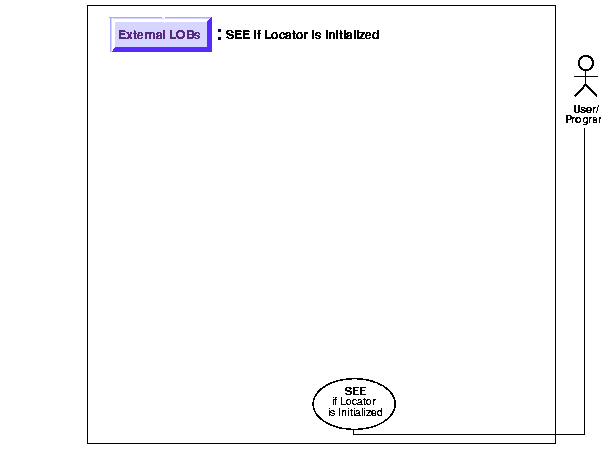Release 1 (9.0.1)
Part Number A88879-01
Home |
Book List |
Contents |
Index | Master Index | Feedback |
| Oracle9i Application Developer's Guide - Large Objects (LOBs) Release 1 (9.0.1) Part Number A88879-01 |
|
External LOBs (BFILEs), 30 of 41

|
See Also:
"Use Case Model: External LOBs (BFILEs)" for all basic operations of External LOBs (BFILES). |
This procedure describes how to determine if a BFILE LOB locator is initialized.
On the client side, before you call any OCILob* interfaces (such as OCILobWrite), or any programmatic environments that use OCILob* interfaces, first initialize the LOB locator, via a SELECT, for example.
If your application requires a locator to be passed from one function to another, you may want to verify that the locator has already been initialized. If the locator is not initialized, you could design your application either to return an error or to perform the SELECT before calling the OCILob* interface.
See Chapter 3, "LOB Support in Different Programmatic Environments" for a list of available functions in each programmatic environment. Use the following syntax references for each programmatic environment:
Not applicable.
The examples are provided in the following programmatic environments:
/* Select the lob/bfile from the Multimedia table */ void selectLob(Lob_loc, errhp, svchp, stmthp) OCILobLocator *Lob_loc; OCIError *errhp; OCISvcCtx *svchp; OCIStmt *stmthp; { OCIDefine *dfnhp; text *selstmt = (text *) "SELECT Photo FROM Multimedia_tab \ WHERE Clip_ID = 3"; /* Prepare the SQL select statement */ checkerr (errhp, OCIStmtPrepare(stmthp, errhp, selstmt, (ub4) strlen((char *) selstmt), (ub4) OCI_NTV_SYNTAX, (ub4)OCI_DEFAULT)); /* Call define for the bfile column */ checkerr (errhp, OCIDefineByPos(stmthp, &dfnhp, errhp, 1, (dvoid *)&Lob_loc, 0 , SQLT_BFILE, (dvoid *)0, (ub2 *)0, (ub2 *)0, OCI_DEFAULT)); /* Execute the SQL select statement */ checkerr (errhp, OCIStmtExecute(svchp, stmthp, errhp, (ub4) 1, (ub4) 0, (CONST OCISnapshot*) 0, (OCISnapshot*) 0, (ub4) OCI_DEFAULT)); } void BfileIsInit(envhp, errhp, svchp, stmthp) OCIEnv *envhp; OCIError *errhp; OCISvcCtx *svchp; OCIStmt *stmthp; { OCILobLocator *bfile_loc; boolean is_init; /* Allocate the locator descriptors */ (void) OCIDescriptorAlloc((dvoid *) envhp, (dvoid **) &bfile_loc, (ub4) OCI_DTYPE_FILE, (size_t) 0, (dvoid **) 0); /* Select the bfile */ selectLob(bfile_loc, errhp, svchp, stmthp); checkerr(errhp, OCILobLocatorIsInit(envhp, errhp, bfile_loc, &is_init)); if (is_init == TRUE) { printf("Locator is initialized\n"); } else { printf("Locator is not initialized\n"); } /* Free the locator descriptor */ OCIDescriptorFree((dvoid *)bfile_loc, (ub4)OCI_DTYPE_FILE); }
This script is also provided in $ORACLE_HOME/rdbms/demo/lobs/proc/finitial
/* Pro*C/C++ has no form of embedded SQL statement to determine if a BFILE locator is initialized. Locators in Pro*C/C++ are initialized when they are allocated via the EXEC SQL ALLOCATE statement. However, an example can be written that uses embedded SQL and the OCI as is shown here: */ #include <sql2oci.h> #include <stdio.h> #include <sqlca.h> void Sample_Error() { EXEC SQL WHENEVER SQLERROR CONTINUE; printf("%.*s\n", sqlca.sqlerrm.sqlerrml, sqlca.sqlerrm.sqlerrmc); EXEC SQL ROLLBACK WORK RELEASE; exit(1); } void BFILELocatorIsInit_proc() { OCIBFileLocator *Lob_loc; OCIEnv *oeh; OCIError *err; boolean isInitialized = 0; EXEC SQL WHENEVER SQLERROR DO Sample_Error(); EXEC SQL ALLOCATE :Lob_loc; EXEC SQL SELECT Mtab.Voiced_ref.Recording INTO :Lob_loc FROM Multimedia_tab Mtab WHERE Mtab.Clip_ID = 3; /* Get the OCI Environment Handle using a SQLLIB Routine: */ (void) SQLEnvGet(SQL_SINGLE_RCTX, &oeh); /* Allocate the OCI Error Handle: */ (void) OCIHandleAlloc((dvoid *)oeh, (dvoid **)&err, (ub4)OCI_HTYPE_ERROR, (ub4)0, (dvoid **)0); /* Use the OCI to determine if the locator is Initialized: */ (void) OCILobLocatorIsInit(oeh, err, Lob_loc, &isInitialized); if (isInitialized) printf("Locator is initialized\n"); else printf("Locator is not initialized\n"); /* Note that in this example, the locator is initialized: */ /* Deallocate the OCI Error Handle: */ (void) OCIHandleFree(err, OCI_HTYPE_ERROR); /* Release resources held by the locator: */ EXEC SQL FREE :Lob_loc; } void main() { char *samp = "samp/samp"; EXEC SQL CONNECT :samp; BFILELocatorIsInit_proc(); EXEC SQL ROLLBACK WORK RELEASE; }
|
|
 Copyright © 1996-2001, Oracle Corporation. All Rights Reserved. |
|